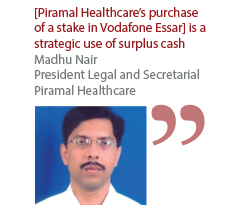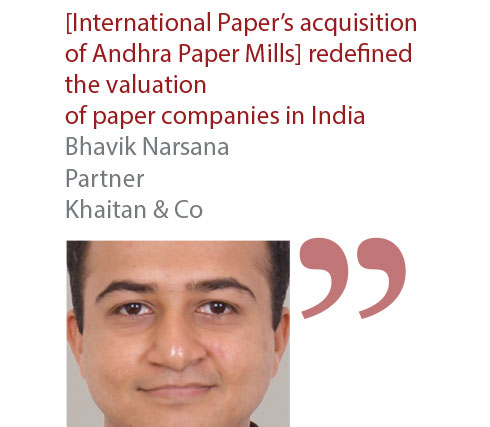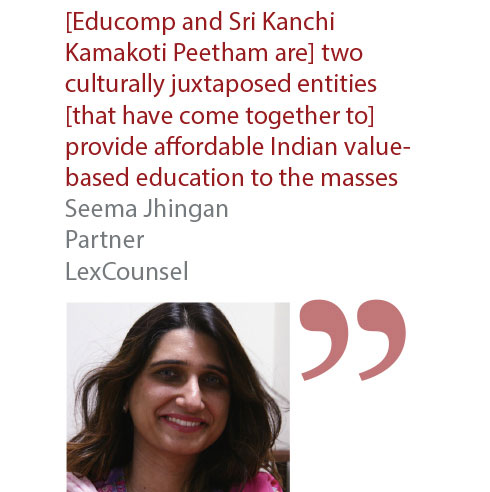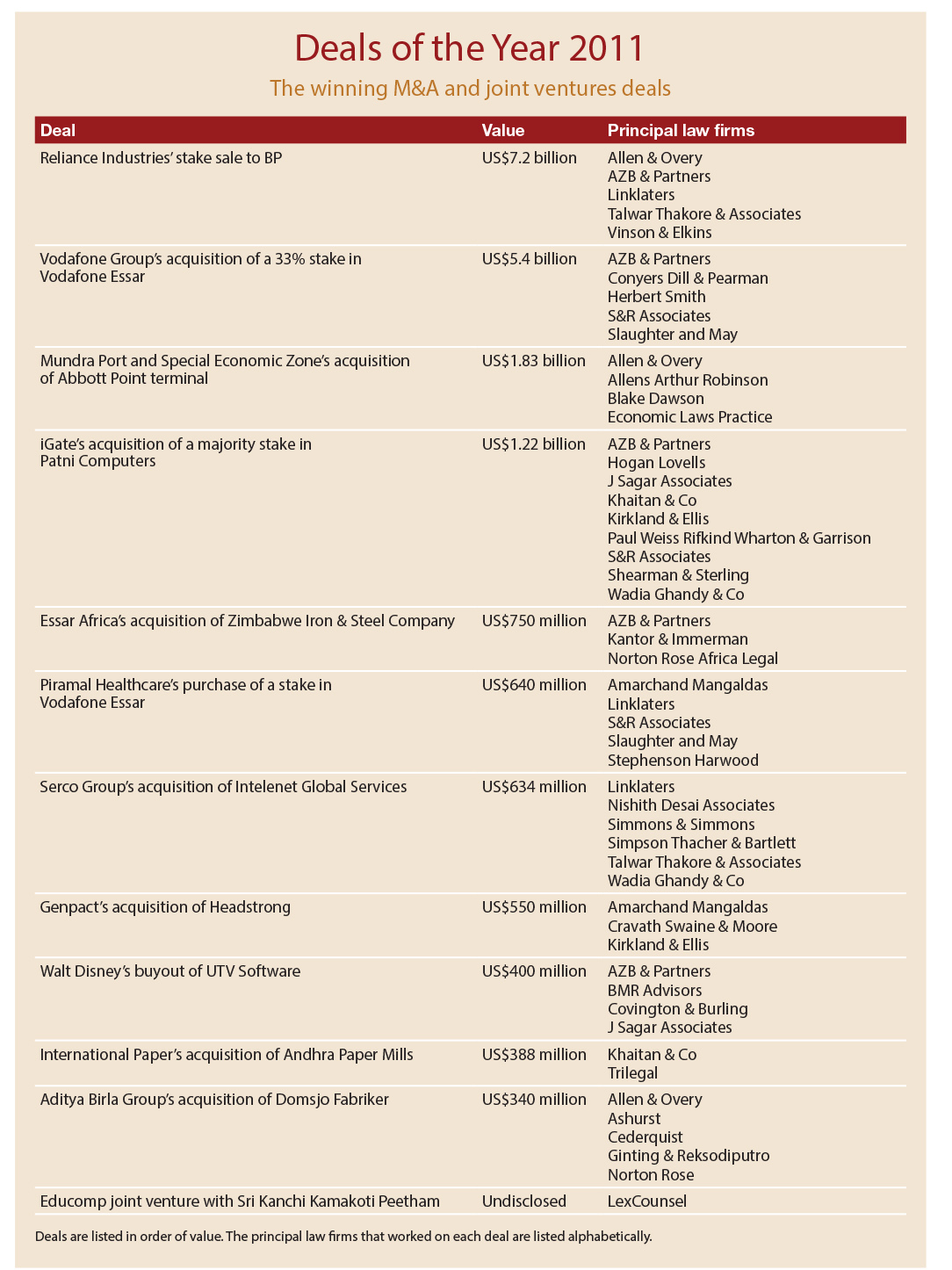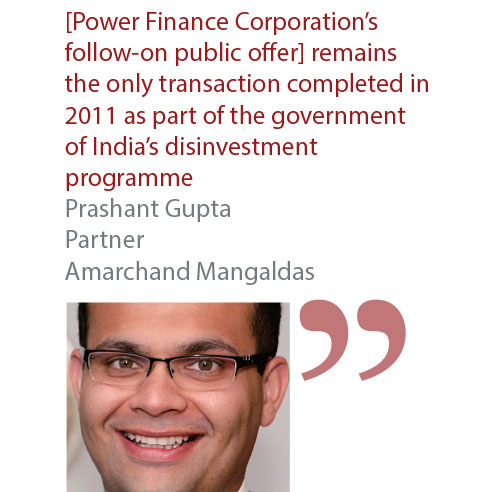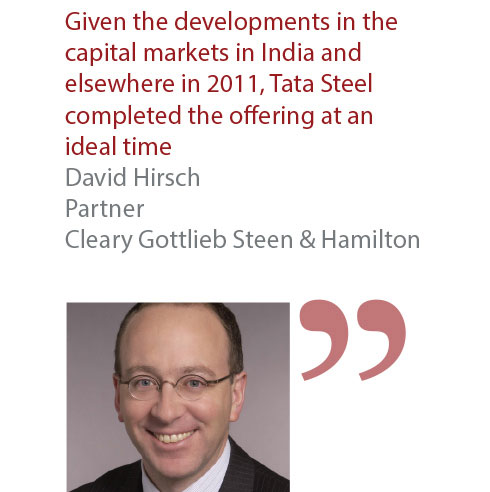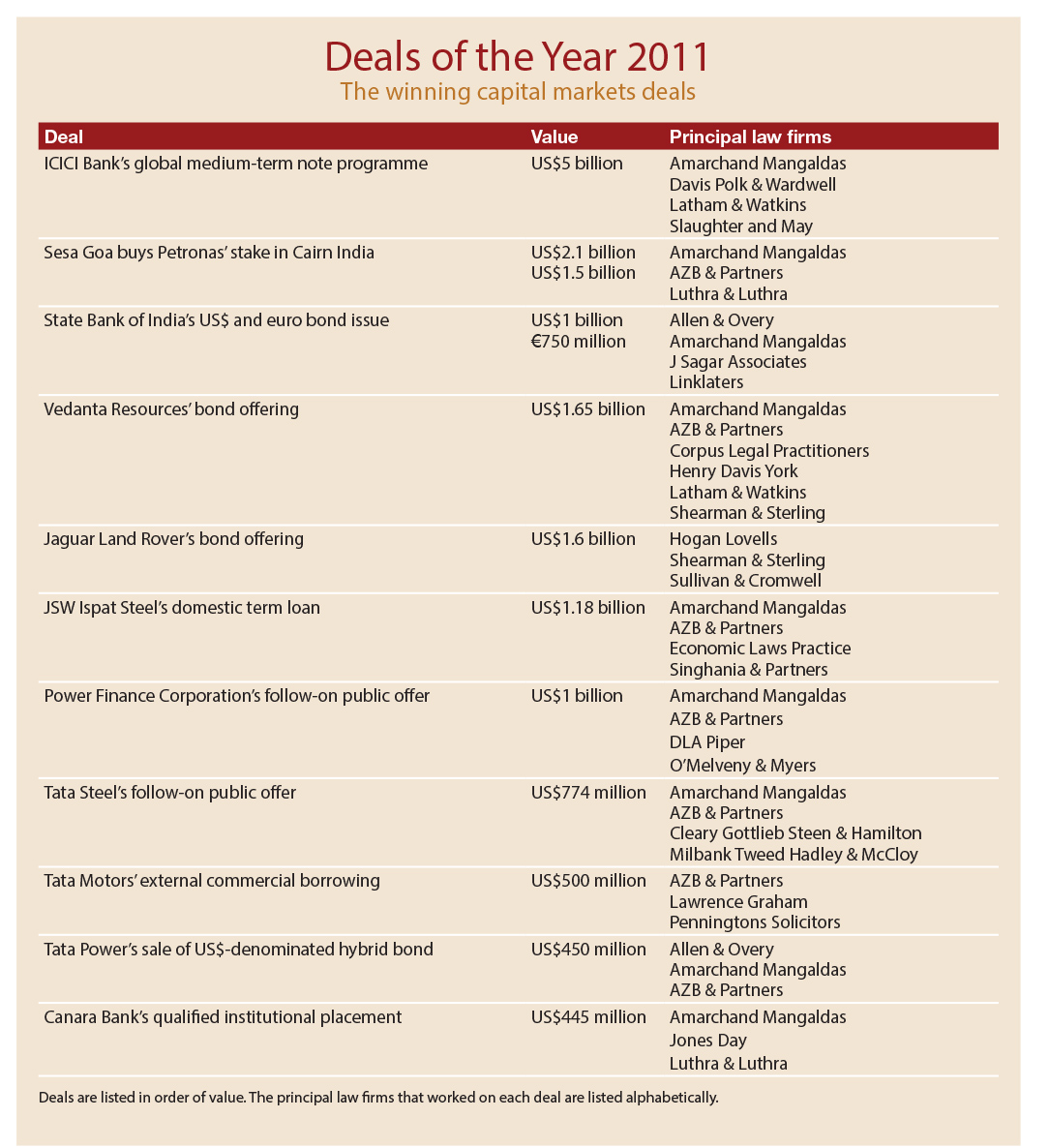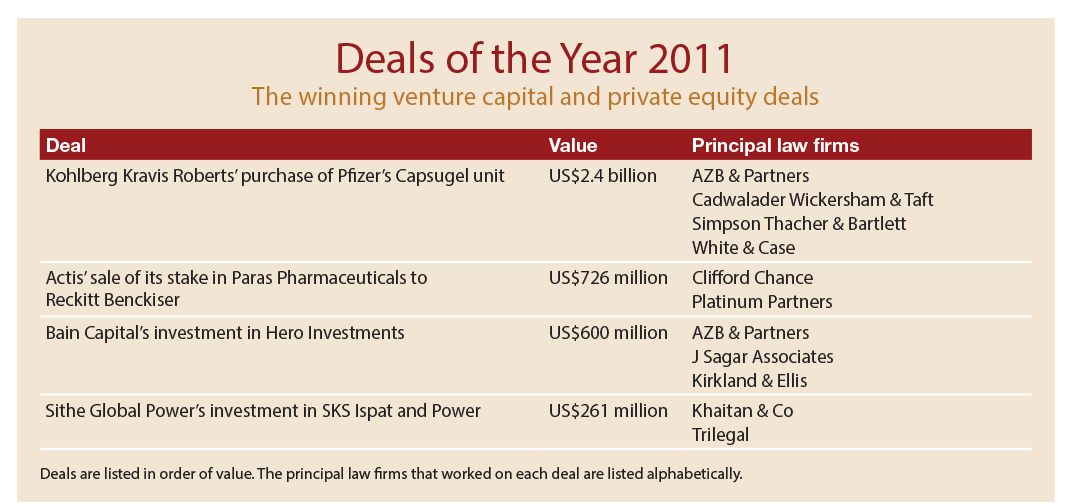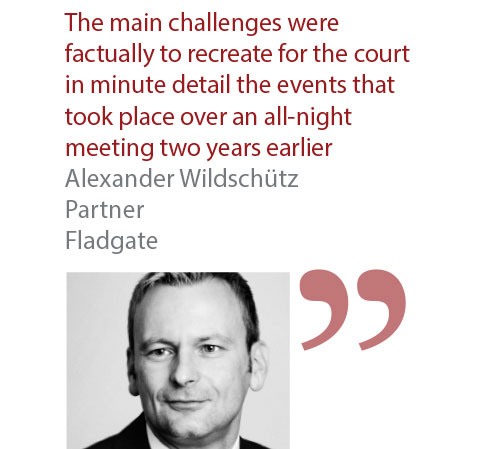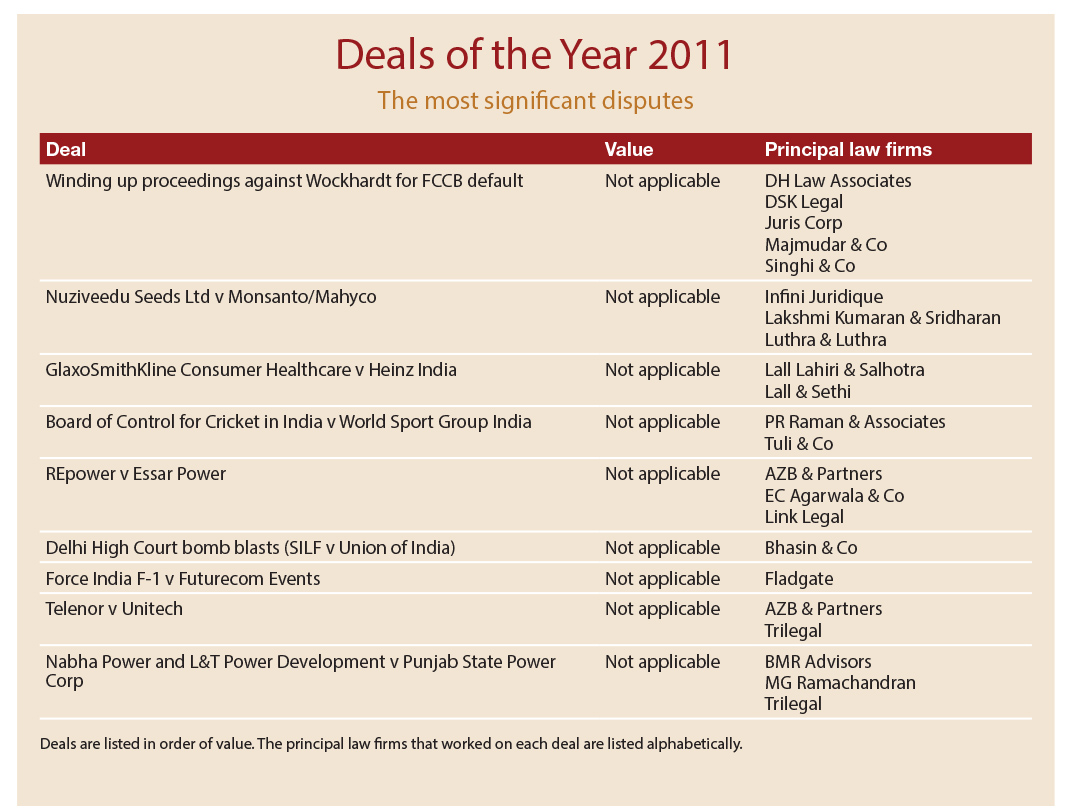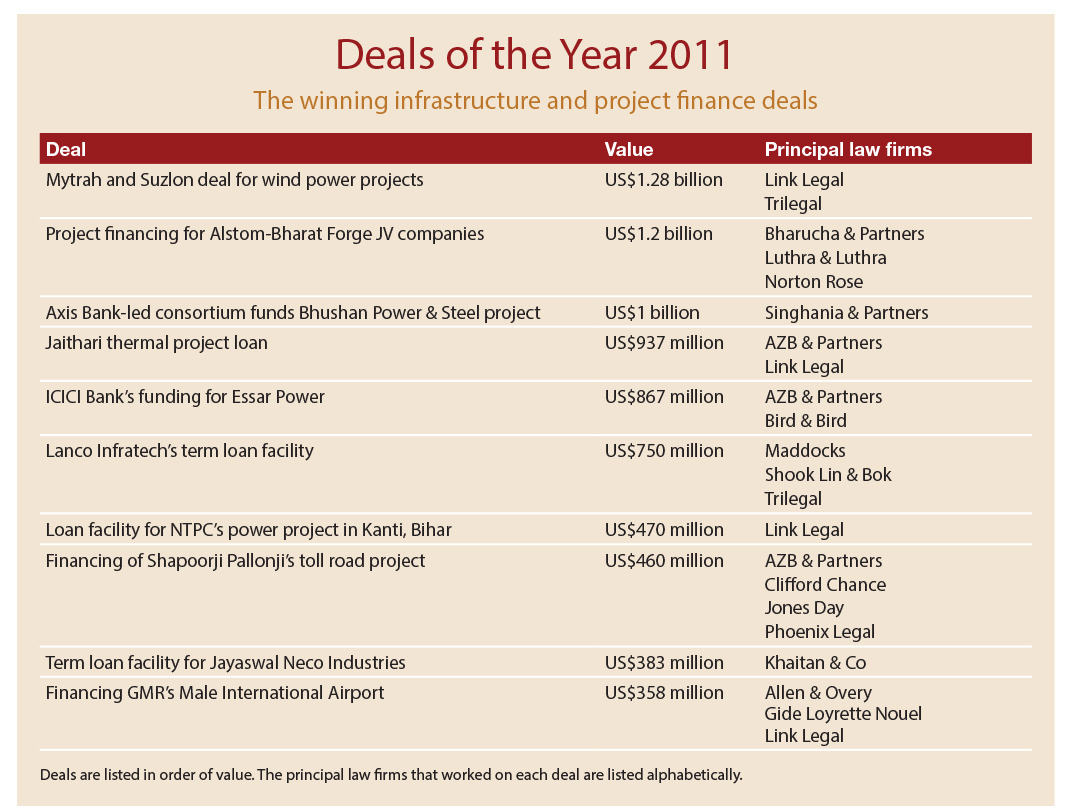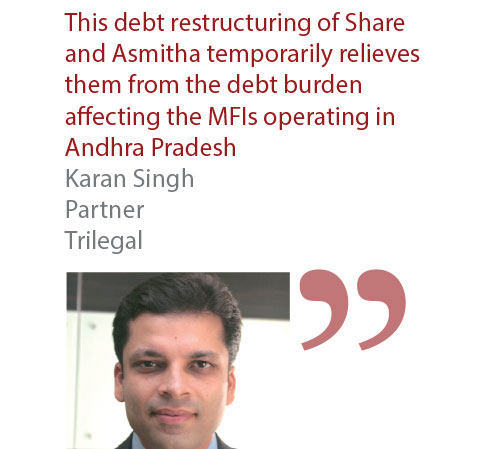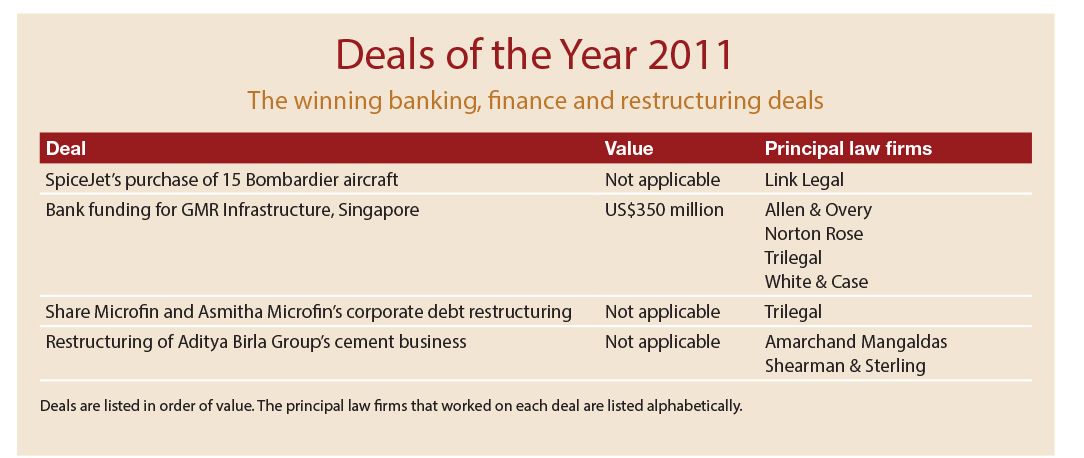The global financial crisis may have crippled many economies in the West, but it has thrown up a host of opportunities in other regions. In India the deal-making scenario has been robust, albeit somewhat cautious, for both foreign multinationals seeking a toe-hold in the country and domestic companies.
In 2011 there were as many deals inbound as outbound as companies expanded into new territories. The year also saw borrowers with ties to India raising long-term debt in the US and UK markets, as they expected domestic interest rates to rise.
Following a lengthy period of research and consultation, India Business Law Journal has identified 50 landmark deals and disputes that were sealed between December 2010 and December 2011. The winning deals and cases, which are divided into six categories, have been chosen subjectively based on transactional data, submissions received from Indian and international law firms, and interviews conducted with India-focused legal and corporate professionals.
In deciding the winning deals and cases, our editorial team evaluated the significance of all shortlisted contenders from a legal and regulatory standpoint. Deals were chosen not for their size, but for the novelty and complexity of the transaction or case and for any precedents that may have been established.
One deal that we considered, but did not include, is the financing of 180 aircraft purchased by Indigo Airlines. While this deal is noteworthy for its sheer size and value, it was not chosen as it involved several smaller financing transactions for each aircraft purchased. As Jyoti Sagar, founder partner of J Sagar Associates, says: “When each individual aircraft is delivered, there is an opinion done by a foreign firm and an Indian firm on Indian law aspects. Again not a one-time opinion! So in a way there is no ‘deal’ in that sense of the term.”
We have also not included deals – like Vedanta Resources’ purchase of Cairn India – that were signed in 2010 but received regulatory approval only in 2011.
M&A and Joint Ventures Deals of the Year
|
|
Reliance Industries’ stake sale to BP |
|
|
Value |
Principal law firms |
|
|
US$7.2 billion |
Allen & Overy Linklaters Talwar Thakore & Associates Vinson & Elkins |
|
A high point of 2011 was the signing of a US$7.2 billion tie-up between Reliance Industries and BP in February. With future capital commitments this deal could be valued at up to US$20 billion.
This cross-border, multi-decade deal constitutes one of the largest foreign direct investments into India’s oil and gas sector. It gives BP a 30% stake in 23 production-sharing contracts and exploration bonuses of up to US$1.8 billion. It also involves the formation of a joint venture for the sourcing and marketing of gas, and the development of related infrastructure.
“It is a significant deal for BP which has helped Reliance monetize its reserves in the KG basin,” says Narayan Iyer, a partner at Talwar Thakore & Associates, who advised BP on Indian law. He was assisted by Praveen Thomas.
The oil and gas blocks involved are largely unexplored. They include the KG-D6 block that currently produces over 40% of India’s gas supplies and 30% of gas consumed in the country. India imports 70% of its gas requirement.
Reliance turned to Allen & Overy for advice on the deal. Oil and gas partners John Geraghty and Paul Griffin led the firm’s team. Vinson & Elkins’ James Cuclis and Gary Kotara, and AZB & Partners’ Suva Mandal and Abhijit Joshi also represented Reliance.
BP was advised by a team from Linklaters led by Sandeep Katwala, head of its India practice, and Stephen Griffin.
Pointing out that the transaction did not involve a transfer of shares, Iyer says it “raised a number of unusual aspects for an M&A transaction”.
|
|
Vodafone Group’s acquisition of a 33% stake in Vodafone Essar |
|
|
Value |
Principal law firms |
|
|
US$5.4 billion |
Conyers Dill & Pearman Herbert Smith Slaughter and May |
|
Mobile phone giant Vodafone paid a hefty US$5.5 billion to sever links with its Indian joint venture partner Essar, with which it had a turbulent relationship. In July Vodafone bought a 33% stake in Vodafone Essar owned by two of Essar’s Mauritius-based companies.
Vodafone and Essar had worked together since 2007, when Vodafone bought Hutchison Telecommunications International’s controlling interest in Hutchison Essar, in which Essar had a 33% interest. The company was subsequently renamed Vodafone Essar.
Conyers Dill & Pearman’s Sameer Tegally and Nicolas Richard advised Vodafone on regulation and statutory issues in Mauritius. Slaughter and May acted for Vodafone while S&R Associates advised Vodafone on the Indian aspects of the transaction.
Shameek Chaudhuri, a Mumbai-based partner at AZB & Partners, acted for Essar on Indian aspects of the deal, while Herbert Smith represented it on international aspects. Their team included Clive Barnard and Greg Mulley.
|
|
Mundra Port and Special Economic Zone’s acquisition of Abott Point terminal |
|
|
Value |
Principal law firms |
|
|
US$1.83 billion |
Allen & Overy Allens Arthur Robinson Blake Dawson |
|
Mundra Port and Special Economic Zone (MPSEZ) acquired Abott Point X 50 coal terminal, in Queensland, Australia. MPSEZ – 77% of which is owned by Adani Enterprises – runs India’s biggest private port.
“This transaction will propel MPSEZ into the global arena,” says Jatin Jalundhwala, chief legal officer of Adani. The acquisition is by way of a 99-year lease of the terminal area and acquisition of assets required to operate the port.
“It is the first major infrastructure investment by an Indian company in Australia,” says Tony Denholder, a partner at Blake Dawson, who along with Damian Salsbury, Richard Brockett, Nerida Cooley and Richard Flynn advised the buyer on Australian law. He adds that the deal is also significant as it involves the sale of a strategic government asset
Denholder points out that the “key challenge was the complexity of the asset being purchased”, which had multiple tenures and commercial arrangements. Vikram Nankani, a Mumbai-based partner at Economic Laws Practice, advised MPSEZ on Indian law.
A team from Allen & Overy comprising Kayal Sachi, Chris Robertson, James Gibson and David Greenwood counselled the lender, Standard Chartered Bank, which provided A$1 billion (US$1 billion) to finance the deal. Allens Arthur Robinson acted for the Queensland government.
|
|
iGate’s acquisition of a majority stake in Patni Computers |
|
|
Value |
Principal law firms |
|
|
US$1.22 billion |
Hogan Lovells Kirkland & Ellis Paul Weiss Rifkind Wharton Shearman & Sterling Wadia Ghandy & Co |
|
The most remarkable deal in the IT sector in 2011 was the acquisition of Mumbai-based outsourcer Patni Computer Systems by a US-based Indian outsourcer, iGate.
This deal contained three synchronized transactions: investment in iGate by a private equity firm, Apax; a high-yield bond offer; and the acquisition of Patni, which was much larger than iGate. It is the first deal to use high-yield financing from a US issuer for the acquisition of an Indian public company.
Kirkland & Ellis’ partners Srinivas Kaushik, Frederick Tanne, Susan Zachman, Joshua Korff, Michael Kim and Jay Ptashek represented iGate and Apax. Shearman & Sterling represented Jefferies Finance and RBC Capital Markets, which financed the deal.
Three brothers – Narendra, Ashok and Gajendra Patni – had together held a 46% stake in Patni Computers. Private equity firm General Atlantic held a 17.4% stake. The agreement to acquire their stakes triggered a mandatory tender offer for an additional 20% of Patni’s shares.
“Where each seller was an important player in the process, patience was key to getting a deal done that worked for everyone,” says Kaushik, who led the Kirkland team.
Khaitan & Co was iGate’s legal counsel in India, with a team comprising three partners: Haigreve Khaitan, Rabindra Jhunjhunwala and Aakash Choubey. “Key issues when there are multiple shareholders are the divergence of views, philosophies and commercials with respect to the transaction,” says Jhunjhunwala.
J Sagar Associates advised the eldest Patni brother, Narendra, while the two younger brothers were represented by Hogan Lovells.
Zia Mody, Alka Nalavadi and Essaji Vahanvati of AZB & Partners in Mumbai advised the sellers. Wadia Ghandy & Co advised Patni on the delisting. General Atlantic was represented by Paul Weiss Rifkind Wharton & Garrison and the Indian law firm S&R Associates.
|
|
Essar Africa’s acquisition of Zimbabwe Iron & Steel Company |
|
|
Value |
Principal law firms |
|
|
US$750 million |
Kantor & Immerman Norton Rose Africa Legal |
|
Essar Africa Holdings, a subsidiary of the Essar Group, acquired the steel and mining-related assets and liabilities of state-owned Zimbabwe Iron & Steel Company (Zisco). As a result, there will be two Zisco entities – NewZim Steel and NewZim Minerals – with Essar Africa holding a 60% stake in the steel venture and 80% of the mining company.
“We have been working hard to give our business a global flavour, and Zisco is one of the shining spots in sub-Saharan Africa,” says Firdhose Coovadia, resident director Middle East and Africa of the Essar Group. Zisco ceased operations in 2008 and will now be revived.
Zimbabwe’s industry and commerce minister, Welshman Ncube, said: “While this deal is a signal that serious players are investing in Zimbabwe, it can also be a catalyst for attracting further foreign direct investment.”
Essar Africa was represented by Shameek Chaudhuri, a partner at AZB & Partners; Africa Legal, a Norton Rose offshoot in Johannesburg; and Harare-based Kantor & Immerman. The office of the attorney general of Zimbabwe acted for Zisco.
|
|
Piramal Healthcare’s purchase of a stake in Vodafone Essar |
|
|
Value |
Principal law firms |
|
|
US$640 million |
Amarchand Mangaldas Linklaters Slaughter and May Stephenson Harwood |
|
In the tradition of cash-rich Indian companies chasing booming businesses, Piramal Healthcare bought a 5.5% stake in Vodafone Essar for US$640 million, after selling its healthcare formulations business to Abbott for US$3.8 billion.
Madhu Nair, president legal and secretarial at Piramal Healthcare, describes the deal as “a strategic use of surplus cash”. Analysts see it as a win-win for both the buyer and seller. Piramal gets to park part of its funds from the earlier sale, while Vodafone complies with the 74% foreign direct investment limit in telecom
Andrew Edge, who led the Stephenson Harwood team that advised Piramal Healthcare on the English law aspects of the acquisition, describes the deal as “highly innovative” as Piramal Healthcare, a pharmaceutical company, was acting in effect as a private equity investor.
The Stephenson Harwood team included Nick Avery and David Lacey. Amarchand Mangaldas advised Piramal Healthcare in India. Vodafone was advised by Linklaters’ Toby Grimstone and Slaughter and May’s Roland Turnill. In India Vodafone received advice from S&R Associates.
|
|
Serco Group’s acquisition of Intelenet Global Services |
|
|
Value |
Principal law firms |
|
|
US$634 million |
Linklaters Nishith Desai Associates Simmons & Simmons Simpson Thacher & Bartlett Talwar Thakore & Associates Wadia Ghandy & Co |
|
In one of the largest private equity exits in India, the UK’s Serco Group acquired a 66% stake in Intelenet Global Services from private equity firm Blackstone. The all-cash deal worth US$634 million also saw Serco buy out other shareholders of Intelenet, including Barclays.
Intelenet is a Mumbai-based back-office service provider and this acquisition gives Serco a foothold in an emerging market. Feroz Dubash at Talwar Thakore & Associates, which advised Serco on Indian law, says that this was Blackstone’s first exit in India. The firm’s team was led by Dubash and Kunal Thakore.
Serco, which provides business services to sectors such as transport and healthcare in the UK and elsewhere, said that the acquisition supports the group’s ambitions through the addition of back-office services.
A team from Linklaters led by William Buckley and Savi Hebbur represented Serco. Simpson Thacher & Bartlett represented Blackstone, with a team that included Michael Wolfson and Sinjini Saha.
Simmons & Simmons advised Barclays. Nishith Desai Associates was the legal tax counsel for Blackstone. Wadia Ghandy & Co was the legal counsel to key employees and management.
|
|
Genpact’s acquisition of Headstrong |
|
|
Value |
Principal law firms |
|
|
US$550 million |
Amarchand Mangaldas Cravath Swaine & Moore Kirkland & Ellis |
|
Ever since back-office services provider Genpact went public in 2007, it has looked for acquisitions. According to Sarkis Jebejian, a partner at Cravath Swaine & Moore, Genpact’s US$550 million acquisition of Headstrong meets the company’s vision of a strategic fit.
“Our combination is powerful and competitively places us as a leader in these verticals,” said Genpact’s president and CEO, Pramod Bhasin, announcing the deal with Headstrong, a consulting and IT services firm based in Noida.
Cravath Swaine & Moore represented Genpact. Shardul Shroff, managing partner of Amarchand Mangaldas in Delhi, assisted Cravath on the deal.
Headstrong, a portfolio company of private equity firm Welsh Carson Anderson & Stowe, was advised by a team from Kirkland & Ellis that included Michael Movsovich and Christopher Torrente. Bank of America, JP Morgan and UBS Securities financed the deal.
|
Walt Disney’s buyout of UTV Software |
||
|
Value |
Principal law firms |
|
|
US$400 million |
BMR Advisors Covington & Burling |
|
Covington & Burling represented the Walt Disney Company in its offer to buy out the public shareholders of UTV Software Communications. Disney already had a 50.6% stake in UTV, which is an integrated media and entertainment company with an estimated value of US$910 million.
The transaction, which is yet to close, is structured as a privately negotiated share purchase from UTV co-founder and CEO Rohinton Screwvala and his affiliates, and a delisting offer to the public shareholders. Disney is aware that delisting is a laborious process and said that: “Given the multiple stages and the nature of the process, a successful outcome is uncertain.”
Disney is represented by a Covington & Burling team comprising partners Jack Bodner, Dan Luchsinger and Ralph Voltmer and associates Vishnu Shankar and Sarah Burnham. Its counsel in India is J Sagar Associates.
AZB & Partners is counsel for UTV. BMR Advisors provided advice on tax.
|
International Paper’s acquisition of Andhra Paper Mills |
||
|
Value |
Principal law firms |
|
|
US$388 million |
||
International Paper, a NYSE-listed global paper and packaging company, acquired a 53.5% stake in Andhra Pradesh Paper Mills (APPM) from LN Bangur and his family for approximately US$226 million.
The sellers also entered into a non-compete agreement, for which they received US$57 million. In addition, International Paper acquired 21.5% of APPM’s shares through a public tender offer for approximately US$105 million.
“It was interesting to see a very substantial premium on the market price of the shares for purchase of promoter shareholding,” say Bharat Anand and Bhavik Narsana, partners at Khaitan & Co who supervised the deal for APPM. “It redefined the valuation of paper companies in India.”
Trilegal partners Anand Prasad and Christopher Krishnamoorthy advised International Paper.
|
|
Aditya Birla Group’s acquisition of Domsjo Fabriker |
|
|
Value |
Principal law firms |
|
|
US$340 million |
Allen & Overy Ashurst Cederquist Ginting & Reksodiputro Norton Rose |
|
This deal is a classic case of a customer buying out its supplier. For eight years, the US$30 billion Aditya Birla Group bought pulp for its viscose fibre business from Sweden’s Domsjo Fabriker, a specialty pulp manufacturer. Then in April, the group snapped up Domsjo, which was privately owned, for US$340 million.
The purchase was done through two Aditya Birla companies: Thai Rayon and Indo Bharat Rayon. The group said: “This acquisition is in line with our strategy of having a substantive part of our specialty pulp for our consumption through our captive source.”
Aditya Birla was advised on the acquisition by a team from Ashurst comprising partner and head of the India group Richard Gubbins, and Stockholm-based partners Martin Börresen, Jon Ericson, Mats Johnsson and Mats Rooth. They were assisted by Vaiva Eriksson, Camilla Holmkvist and Anders Strandberg.
“The timing of the acquisition was bad and we persuaded them to wrap up the deal fast,” says Ashok Gupta, group general counsel and chief legal officer.
Norton Rose’s Matthew Escritt and Janelene Chen counselled the borrowers. Allen & Overy advised Standard Chartered Bank on the US$165 million debt financing. “The financing was completed in an extremely tight time frame, with lawyers in Europe and Asia working around the clock to bring the transaction to a successful completion,” says Kayal Sachi, a partner at Allen & Overy.
Ginting & Reksodiputro’s Daniel Ginting and Halintar Tarsis, and Cederquist’s Svante Hultqvist, Sofia Tornroth, Johanna Bergsten and Mikeal Magnusson also counselled the lenders.
|
|
Educomp joint venture with Sri Kanchi Kamakoti Peetham |
|
|
Value |
Principal law firms |
|
|
Undisclosed |
LexCounsel |
|
Religious organizations in India have long supported education as part of their charitable work. But now a company – Educomp Infrastructure & School Management – has set up a joint venture with a south India-based Hindu monastic institution – the Sri Kanchi Kamakoti Peetham – to set up a chain of 100 schools across India.
LexCounsel partner Seema Jhingan describes the deal as a “first of its kind joint venture” that involves the coming together of “two culturally juxtaposed entities to aid capacity building in the education sector and provide affordable Indian value-based education to the masses”. LexCounsel was counsel to Educomp.
Sri Kanchi Kamakoti Peetham traces its roots to 482 BC, when it was set up by Hindu spiritual leader Sri Adi Sankara. The peetham will provide the land and philosophical education for the schools, while Educomp will facilitate the pedagogically based educational intellectual property, educational content and infrastructure.
A major challenge in putting together the deal was to create and negotiate a viable model for structuring the ownership and usage rights of the buildings to be constructed for the schools across various state jurisdictions in India. Jhingan says a further challenge was to ensure “the structure is both sustainable and scalable as well as enforceable in law”.
Capital Markets Deals of the Year
|
|
ICICI Bank’s global medium-term note programme |
|
|
Value |
Principal law firms |
|
|
US$5 billion |
Amarchand Mangaldas Davis Polk & Wardwell Latham & Watkins Slaughter and May |
|
Davis Polk & Wardwell partners Eugene Gregor, Margaret Tahyar and Antony Dapiran advised one of India’s largest lenders – ICICI Bank – on a US$5 billion global medium-term note (MTN) programme that permits ICICI Bank’s New York branch to be an issuer of the notes. ICICI Bank is the first Indian bank to tap professional investors in the US.
Most Indian MTN programmes do not contemplate sales to US investors, as the disclosure requirements are rigorous, says Ferish Patel, counsel at Davis Polk & Wardwell. “The bank implemented an expanded MTN programme to allow for more diverse, global funding modalities, which is quite an achievement, considering the market conditions.”
“The market environment was getting nervous with the US debt ceiling news and the Greece situation,” says Sudhir Dole, ICICI Bank’s regional head for Asia, the Middle East and Africa. “We got into a market on a good day and managed to do the transaction”.
Slaughter and May advised ICICI Bank on matters of English Law while Amarchand Mangaldas advised on Indian law.
Davis Polk & Wardwell also advised the bank on its Rule 144A and Regulation S offering of US$1 billion aggregate principal amount of 4.75% notes due 2016 under the global MTN programme.
A team from Latham & Watkins led by Min Yee Ng, a Singapore-based partner, assisted by Lee Irvine and Jing Ting Soh, advised the lenders.
|
|
Sesa Goa buys Petronas’ stake in Cairn India |
|
|
Value |
Principal law firms |
|
|
US$2.1 billion US$1.5 billion |
Amarchand Mangaldas Luthra & Luthra |
|
In one of the largest bulk transactions in India to date, Malaysian oil and gas explorer Petronas International sold its entire 14.9% stake in Cairn India for US$2.1 billion. A majority of the shares – 10.4% – divested by Petronas were snapped up by Sesa Goa for around US$1.5 billion. Sesa Goa, an India-listed iron ore miner, is 56% owned by Vedanta Resources.
Bank of America DSP Merrill Lynch brokered the deal and was advised by Amarchand Mangaldas. Acting for Petronas, Luthra & Luthra counsel Deepak THM and Madhurima Mukherjee reviewed and assisted in negotiating and finalizing the trade agreement, transaction documents and broker agreements.
“As the transaction involved a sale of a large block of shares, it was innovatively structured to ensure a successful sale of all the shares,” says Deepak.
AZB & Partners represented Sesa Goa in acquiring 200 million shares from Petronas through an open-market purchase. Vedanta has spent US$2.6 billion of its cash reserves to build up an 18.5% stake in Cairn India, much to the chagrin of minority shareholders.
|
|
State Bank of India’s US$ and euro bond issue |
|
|
Value |
Principal law firms |
|
|
US$1 billion €750 million |
Allen & Overy Amarchand Mangaldas Linklaters |
|
Acting through its London branch, State Bank of India (SBI) successfully launched a US dollar and euro bond issue. The US$1 billion 4.5% bond issue and the €750 million 4.5% bond issue are both due in 2015.
It was SBI’s first offering of debt securities to US investors. The euro bond was the largest non-US dollar bond issued by an Indian bank in 2010-2011.
Allen & Overy was international counsel to SBI. Amarchand Mangaldas’ Niloufer Lam and Madhav Kanoria were the issuer’s domestic advisers.
Linklaters was international counsel to the joint lead managers and bookrunners. The firm’s team included Jeremy Webb and Gloria Cheung for the euro bond and Hyung Jung Ahn for the US dollar issue. J Sagar Associates provided advice in India.
|
|
Vedanta Resources’ bond offering |
|
|
Value |
Principal law firms |
|
|
US$1.65 billion |
Amarchand Mangaldas Corpus Legal Practitioners Henry Davis York Latham & Watkins Shearman & Sterling |
|
After a three-year absence from the international bond market, Vedanta Resources, a globally diversified metals and mining company, tapped the bond market for US$1.65 billion to help finance its purchase of Cairn Energy’s assets in India.
The issue comprised US$750 million in 6.75% bonds due 2016 and US$900 million in 8.25% bonds due 2021. It attracted more than 200 investors from the US, Europe and Asia and was Asia’s largest high-yield corporate bond to date, according to Dealogic (excluding bonds issued by US entities owned by Asian parents).
Latham & Watkins represented Vedanta in connection with the offering, with a team comprising partners Rajiv Gupta, Michael Sturrock, Lene Malthasen, Samuel Weiner, Pardis Zomorodi and Sean Finn. AZB & Partners acted as special Indian counsel to Vedanta. Shearman & Sterling’s Kyungwon Lee and Mei Lian were the underwriters’ counsel. Amarchand Mangaldas, Corpus Legal Practitioners and Henry Davis York were also associated with the deal.
|
|
Jaguar Land Rover’s bond offering |
|
|
Value |
Principal law firms |
|
|
US$1.6 billion |
Hogan Lovells Shearman & Sterling Sullivan & Cromwell |
|
Luxury car maker Jaguar Land Rover (JLR) launched a US$1.6 billion bond sale – its first since Tata Motors took it over. The bond sale consisted of £500 million (US$765 million) in 8.125% senior notes due 2018, US$$410 million in 7.75% senior notes due 2018, and US$410 million in 8.125% senior notes due 2021.
“We are pleased to have completed this transaction which we believe demonstrates the market’s confidence in our company and its plans,” JLR chief financial officer Kenneth Gregor said.
Tata Motors said that the sale would strengthen JLR’s finances without having to rely on the support of the parent company, which is India’s biggest vehicle maker.
The issuers’ joint counsel were Hogan Lovells and Shearman & Sterling. Jacques McChesney and Apostolos Gkoutzinis of Shearman & Sterling advised on US and UK aspects. Sullivan & Cromwell, led by William Plapinger and Vanessa Blackmore, advised the underwriters.
|
|
JSW Ispat Steel’s domestic term loan |
|
|
Value |
Principal law firms |
|
|
US$1.18 billion |
Amarchand Mangaldas Singhania & Partners |
|
JSW Ispat Steel obtained a US$1.18 billion term loan from a consortium of 10 lenders led by Bank of India, Canara Bank and Punjab National Bank. The loan enabled the company to extract itself from a corporate debt refinancing procedure. At 11.75%, the average rate of interest is considerably less than what it had paid on earlier loans.
AZB & Partners senior partner Bahram Vakil was Bank of India’s legal counsel, while the rest of the banks were advised by Singhania & Partners. Earlier, AZB had advised the borrower on its US$280 million foreign currency borrowing from a consortium of international banks.
In February, JSW had acquired 41.29% of the debt-laden Ispat Steel from the Mittal family. Amarchand Mangaldas represented JSW, while the Mittals were advised by Economic Laws Practice.
Months before the acquisition, JSW’s steel project in Bellary, to be financed by IDBI Bank, had come under a cloud. Singhania & Partners was counsel to IDBI Bank.
|
|
Power Finance Corporation’s follow-on |
|
|
Value |
Principal law firms |
|
|
US$1 billion |
Amarchand Mangaldas DLA Piper O’Melveny & Myers |
|
Power Finance Corporation (PFC), a leading government-owned lending institution, undertook a follow-on public offer (FPO) of US$1 billion in equity shares. It consisted of a fresh issue of equity shares and additional shares, and was marketed in the US and elsewhere under Rule 144A and Regulation S.
O’Melveny & Myers’ international counsel Pooja Sinha represented the lenders. DLA Piper’s Biswajit Chatterjee was the issuer’s international counsel, while AZB & Partners’ Meera Singh Joyce was the issuer’s Indian counsel.
The FPO was the largest in India in 2011.
The underwriters’ international counsel Prashant Gupta, a partner at Amarchand Mangaldas, points out that “it remains the only transaction completed in 2011 as part of the government of India’s disinvestment programme”.
This transaction was one of the most complicated government disinvestments as PFC is a non-banking financial company, which is highly regulated, and as a result the disclosure requirements were complex.
|
|
Tata Steel’s follow-on public offer |
|
|
Value |
Principal law firms |
|
|
US$774 million |
Amarchand Mangaldas Cleary Gottlieb Steen & Hamilton Milbank Tweed Hadley & McCloy |
|
Cleary Gottlieb Steen & Hamilton’s David Hirsch and Jang Yeo represented Tata Steel in its follow-on public offer of 57 million equity shares, raising approximately US$774 million. The offering had a Rule 144A and Regulation S component and was Tata Steel’s first offering on the US market.
“In hindsight, given the developments in the capital markets in India and elsewhere in 2011, Tata Steel completed the offering at an ideal time,” says Hirsch. “The ability of our team to execute the deal quickly and effectively proved crucial in achieving that goal.”
Amarchand Mangaldas was the Indian counsel to Tata Steel. Its team was led by the firm’s managing partner in Mumbai, Cyril Shroff, and included Yash Ashar and Abhimanyu Bhattacharya.
The issue, which was completed on a fast-track basis, required extensive negotiations with the underwriters, as the company’s global operations posed considerable challenges for due diligence.
The international counsel to the underwriters were Milbank Tweed Hadley & McCloy’s Anthony Root and Andrew Yang.
AZB & Partners’ Shameek Chaudhuri and Varoon Chandra were the domestic counsel to the underwriters.
|
|
Tata Motors’ external commercial borrowing |
|
|
Value |
Principal law firms |
|
|
US$500 million |
Lawrence Graham Penningtons Solicitors |
|
Tata Motors joined a long list of Indian companies which raised money from overseas markets, when high input costs and sagging sales prompted it to raise US$500 million in external commercial borrowing (ECB).
State Bank of India (SBI) – acting through its London branch – was the mandated lead arranger and facility agent in the English law-governed term loan, which was syndicated in various jurisdictions including Canada and the US.
Lawrence Graham’s Akhil Sharma represented SBI. The firm was selected on account of recent deals it was involved in, including a US$200 million ECB term loan facility for Bharat Aluminium for which SBI was the lead arranger and facility agent.
AZB & Partners, represented by Ashwin Ramanathan, was the Indian counsel for Tata Motors, while Penningtons Solicitors’ Malcolm Pearson acted for the company internationally.
|
|
Tata Power’s sale of US$-denominated hybrid bond |
|
|
Value |
Principal law firms |
|
|
US$450 million |
Allen & Overy Amarchand Mangaldas |
|
Tata Power issued US dollar-denominated hybrid bonds – becoming the first Indian company to do so.
Allen & Overy advised the joint lead managers on the US$450 million hybrid capital offering of a 8.5% bond, guaranteed by Tata Power, due in 2071 and non-callable for five years.
Amarchand Mangaldas’ debt capital markets partner Niloufer Lam acted for the lead managers. Varoon Chandra of AZB & Partners acted for the guarantor, the Tata Power subsidiary Bhira Investments.
|
Canara Bank’s qualified institutional placement |
||
|
Value |
Principal law firms |
|
|
US$445 million |
Amarchand Mangaldas Jones Day Luthra & Luthra |
|
This deal reflects a trend at the start of 2011, when Indian financial institutions raised capital through the equity markets. “The QIP is to fund future growth and meet Basel III requirements,” said S Raman, chairman and managing director of Canara Bank.
Amarchand Mangaldas was the domestic counsel to Canara Bank. Jones Day’s Manoj Bhargava acted as international counsel to the bookrunners in the US$445 million qualified institutional placement. Luthra & Luthra was domestic counsel to the bookrunners.
Venture Capital and Private Equity Deals of the Year
|
|
Kohlberg Kravis Roberts’ purchase of Pfizer’s Capsugel unit |
|
|
Value |
Principal law firms |
|
|
US$2.4 billion |
Cadwalader Wickersham & Taft Simpson Thacher & Bartlett White & Case |
|
Pfizer, the world’s biggest drug maker, sold its Capsugel pill casings manufacturing business to private equity firm Kohlberg Kravis Roberts (KKR). Analysts say that Pfizer wants to concentrate on its high-margin business by developing new medicines. As Indian counsel to Pfizer, AZB & Partners, led by partner Srinath Dasari, was involved in reviewing transaction documents, advising on transaction structuring and regulatory matters in relation to the Capsugel business in India.
Pfizer’s other legal advisers included Cadwalader Wickersham & Taft and White & Case. Simpson Thacher & Bartlett acted as legal counsel for KKR.
|
|
Actis’ sale of its stake in Paras Pharmaceuticals to Reckitt Benckiser |
|
|
Value |
Principal law firms |
|
|
US$726 million |
Clifford Chance Platinum Partners |
|
Clifford Chance advised private equity firm Actis on the disposal of its stake in Paras Pharmaceuticals to British consumer goods company Reckitt Benckiser. Reckitt Benckiser acquired 100% of Paras Pharmaceuticals, one of India’s leading fast-moving consumer goods companies, from Actis, Sequoia Capital, Paras founder Girish Patel and family, and other shareholders. This was one of the largest Indian private equity exits conducted under international private equity sell terms.
After an international auction with multiple bidders, involving extensive cross-border negotiations, the final deal included a Mauritian seller, an Indian business and a UK buyer. One of the biggest challenges was dealing with the differing seller status and terms of the private equity sellers, the founder sellers and the management sellers. The deal also involved signing true-up accounts (not completion accounts), to limit seller risk and accommodate local law and indemnity insurance requirements, and using both English and Indian law documents.
Reckitt Benckiser was advised by its internal team, while Nihar Mody, a partner at Platinum Partners was Actis’ Indian counsel.
|
|
Bain Capital’s investment in Hero Investments |
|
|
Value |
Principal law firms |
|
|
US$600 million |
Kirkland & Ellis |
|
At the end of 2010, Indian two-wheeler manufacturer Hero Honda Motors called off its 27-year joint venture partnership. Hero Investments, the investment arm of Hero Motors, agreed to buy out Honda’s 26% stake in the venture for around US$851 million. Of the six private equity firms invited to bid for a stake in Hero Investments, Bain Capital and the Government of Singapore Investment Corporation emerged victorious.
Kirkland & Ellis represented Bain Capital in its purchase of a significant stake in Hero Investment for US$600 million. “The transaction involved the single largest equity investment by a private equity sponsor to date in India,” says Srinivas Kaushik, a partner at Kirkland & Ellis. AZB & Partners was the Indian counsel for Bain and J Sagar Associates advised Hero.
|
|
Sithe Global Power’s investment |
|
|
Value |
Principal law firms |
|
|
US$261 million |
||
Sithe Global Power, an international development company owned by private equity firm Blackstone, invested in SKS Ispat and Power’s 1,200-megawatt power plant in Chattisgarh, northern India. The backers of the capital-intensive coal-fired plant had been seeking strategic investors for the project as they require 60.2 million tonnes of coal every year. With a huge demand-supply gap, Blackstone has been bullish about India’s power sector for some time, having invested in Moser Baer’s power subsidiary and Monnet Power.
A team from Trilegal comprising partner Nishant Parikh, senior associate Rohan Ghosh Roy and associate Anirudh Agarwala acted for Sithe Global. Khaitan & Co partner Nishant Singh and senior associate Rohil Vashisht advised SKS Ispat and Power.
Disputes of the Year
|
|
Winding up proceedings against Wockhardt for FCCB default |
|
|
Value |
Principal law firms |
|
|
Not applicable |
DH Law Associates Majmudar & Co |
|
Wockhardt, a generic drugs maker with headquarters in Mumbai, defaulted on its foreign currency convertible bonds (FCCBs) in 2009. BNY Mellon Corporate Trustee Services, on behalf of the foreign bondholders, filed a winding-up petition against Wockhardt in Bombay High Court. Sun Pharma, an Indian competitor of Wockhardt, was one of the FCCB holders. DH Law Associates protected Sun Pharma Global’s interests by taking timely action against a proposed settlement between Wockhardt and BNY, which would have benefited a particular group of bondholders while compromising the interests of the other bondholders.
“Wockhardt has been directed to deposit the sums towards the maturity of the FCCBs along with accruals,” says Nusrat Hassan, the managing partner of DH Law Associates. Juris Corp and DSK Legal advised the bondholders while Wockhardt was represented by Majmudar & Co. The corporate debt restructuring lenders were advised by Singhi & Co.
This case is significant considering companies’ recent defaults in honouring their FCCB obligations. It sets a positive precedent for foreign currency lenders and bondholders that are looking to invest in Indian companies through this route. It also reassures bondholders that they have an effective judicial remedy if an Indian company defaults. This case has led many companies to reconsider their strategies and restructure their FCCBs.
|
|
Nuziveedu Seeds Ltd v Monsanto/Mahyco |
|
|
Value |
Principal law firms |
|
|
Not applicable |
Infini Juridique Lakshmi Kumaran & Sridharan Luthra & Luthra |
|
Nuziveedu Seeds and Monsanto/Mahyco are at odds over the parent variety of their highly successful hybrids of cotton and Bt cotton. Monsanto claims that C5193 and C5196 are the parents, while Nuziveedu argues that it has prior rights on these and that Monanto’s varieties have been developed using Nuziveedu’s parent hybrids.
Monsanto has filed several applications to register its varieties and also parents C5193 and C5196 with the Protection of Plant Varieties & Farmers’ Rights (PPV&FR) Authority. In each of these cases, Nuziveedu has questioned Monsanto’s claims. The authority extended the time limit for filing an opposition and recorded the opposition. Monsanto’s appeal against this before Delhi High Court is pending. The high court has stayed registration proceedings for all varieties where the parent C5193 is being used. Delhi High Court also dismissed Monsanto/Mahyco’s contention that its filed documents should not be given to anyone and that all opposition proceedings should be based only on the information published in the PPV&FR Authority’s journal. The matter was successfully argued by Infini Juridique, counsel for Nuziveedu. “The bone of contention is the parents of Nuziveedu’s two successful hybrids, which were commercially better than many Monsanto/Mahyco hybrids in Bt and as claimed by Monsanto may have to be rejected by the PPV&FR Authority,” says Abhishek Saket, a partner at Infini Juridique. Lakshmi Kumaran & Sridharan and Luthra & Luthra were Monsanto’s counsel.
|
|
GlaxoSmithKline Consumer Healthcare v Heinz India |
|
|
Value |
Principal law firms |
|
|
Not applicable |
Lall Lahiri & Salhotra Lall & Sethi |
|
GlaxoSmithKline (GSK) Consumer Healthcare instituted two suits against Heinz claiming that GSK’s Horlicks brand had been disparaged in television and print advertisements for Heinz’s rival product, Complan. The Heinz campaign was a response to a Horlicks advertisement.
Cross-actions were heard in Delhi High Court. The court initially granted an interlocutory injunction in favour of GSK and refused to grant an injunction in favour of Heinz in the cross-suit. Lall & Sethi’s managing partner, Chander Lall, acted for GSK, while Heinz was represented by a team from Lall Lahiri & Salhotra comprising managing partner Anuradha Salhotra, partner Rahul Chaudhry, senior associate Amritesh Mishra and associate Sumit Wadhwa.
In the appeal before the first appellate court, Lall Lahiri & Salhotra persuaded the court to stay the judgment pending a final disposal of the appeal. GSK then appealed to the apex court, which did not interfere with the first appellate court’s order.
|
|
Board of Control for Cricket in India v World Sport Group India |
|
|
Value |
Principal law firms |
|
|
Not applicable |
PR Raman & Associates |
|
This case relates to the broadcasting rights for the Indian Premier League (IPL), India’s most successful sporting event in commercial terms.
The termination of the broadcasting licence of the World Sport Group (WSG) by the Board of Control for Cricket in India (BCCI) had been fought in Bombay High Court with the BCCI winning before the single bench and losing before the division bench. The matter reached the Supreme Court in March 2011. The BCCI wanted the court’s assistance to appoint a new licensee after terminating WSG’s licence, as season 4 of the IPL was to start in April.
WSG wanted to ensure transparency in relation to the appointment of any new licensee and accountability by ring-fencing the fees received by the BCCI from the new licensee and the erstwhile sublicensees of WSG, pending the adjudication of the dispute between WSG and the BCCI.
Ultimately, the interests of both parties were protected. While the Supreme Court allowed the BCCI to appoint a new licensee, it ensured that the process of appointment was overseen by a former chief justice of Punjab and Haryana High Court, Justice Mukul Mudgul.
The Supreme Court also ruled that future fees received by BCCI should be placed in escrow pending the outcome of the dispute between WSG and the BCCI. This innovative and constructive resolution was arrived at expeditiously on 21 April, just under two months after the case had reached the Supreme Court.
PR Raman & Associates represented the BCCI, briefing senior counsel CA Sundaram. Neeraj Tuli, the managing partner at Tuli & Co, and Mrinal Ojha, a partner at the firm, acted for WSG, briefing senior counsel, KK Venugopal, CS Vaidyanathan and Aspi Chinoy.
|
|
REpower v Essar Power |
|
|
Value |
Principal law firms |
|
|
Not applicable |
EC Agarwala & Co Link Legal |
|
In late 2010 Essar Wind Power filed a petition against Suzlon Energy-owned REpower Systems under section 9 of the Arbitration and Conciliation Act, 1996. The dispute arose when REpower terminated a licence contract signed in 2006 between the two companies, for the design and manufacture wind turbines to be sold in India and Southeast Asia. Essar sought to restrain REpower from granting a licence for the turbines and other future technology to any third party. When the deal was signed, Essar was to invest in setting up manufacturing capacity in India. REpower terminated the deal saying that Essar had failed to do this. “REpower had signed a 10-year contract with Essar of which four years had lapsed without Essar doing anything,” says Milanka Chaudhury, a partner at Link Legal who represented REpower. “There was no point in continuing.”
AZB & Partners advised the Essar Group, while EC Agarwala & Co represented Essar Wind Power in the Supreme Court.
The injunction petition was unusual in that the petitioner was seeking to restrain an international entity from acting on the termination of a technology licence agreement. The entire round of litigation, including two appeals, was completed within six months.
|
|
Delhi High Court bomb blasts (SILF v Union of India) |
|
|
Value |
Principal law firms |
|
|
Not applicable |
||
The Society of Indian Law Firms (SILF) launched a public interest litigation (PIL) against the central government and Delhi state government for their apathy and lack of concern towards security measures in India’s capital city after bomb blasts and terrorist attacks outside Delhi High Court. Delhi High Court issued notices to the central and state government in September, after the filing of a writ by Lalit Bhasin, the managing partner of Bhasin & Co and president of SILF. The PIL asks the court to order the police department and the government to implement measures necessary to deal with terrorist threats to citizens. It also wants the government to maintain a centralized intelligence system and a battle-ready unit of special police at appropriate locations. In addition, it wants those agencies to disclose to the court the steps to be taken as well as the time frame and funding required. SILF also wants the court to order the government of the National Capital Territory to formulate and implement a crisis management plan and set up a citizens coordination committee which would function under the supervision of the court. “I filed this petition due to the total unpreparedness of our security agencies to meet the terrorists’ activities,” says Bhasin. “I could not remain a silent spectator.”
When the case came up for hearing in mid-December, the central and state governments were yet to file their counter affidavits. The Union of India was represented by Solicitor General AS Chandhioke.
|
|
Force India F-1 v Futurecom Events |
|
|
Value |
Principal law firms |
|
|
Not applicable |
Fladgate |
|
Futurecom Events & Marketing, a German-based supplier of catering and logistics, alleged that the Force India Formula One racing team had acknowledged an indebtedness in an amount exceeding €800,000 (US$1 million) in an agreement written in German. Futurecom argued that the case should be heard in Germany and that Force India should be ordered to make payments under the agreement. Fladgate litigation partners Mark Buckley and Alexander Wildschütz acted for Force India. They argued for the case to be heard in England and proved that the agreement in question did not contain any acknowledgement of the alleged debt. “The dispute involved considerations under German law and English law, both procedurally and on substantive matters,” says Wildschütz. “The main challenges were factually to recreate for the court in minute detail the events that took place over an all-night meeting two years earlier at which Fladgate was not present and of which the parties had very different recollection.
Futurecom was advised by its in-house legal team.
|
|
Telenor v Unitech |
|
|
Value |
Principal law firms |
|
|
Not applicable |
||
Gurgaon District Court issued an injunction against Norweigan telecom operator Telenor following a petition filed by Unitech, the minority shareholder in Indian mobile operator Uninor. Uninor is a joint venture between Telenor and Unitech. Telenor owns a 67.25% stake in Uninor. Telenor and Unitech were at loggerheads over a planned US$1.7 billion rights issue under the joint venture. Unitech claimed that key executives of the Norweigan company had mismanaged the joint venture, creating a rift between the partners. The court restrained Telenor from acting on any board resolutions regarding the rights issue. This order was challenged by Telenor in Punjab & Haryana High Court and then successfully in the Supreme Court. Telenor’s legal counsel was Sitesh Mukherjee, a partner at Trilegal. AZB & Partners acted for Uninor.
|
|
Nabha Power and L&T Power Development v Punjab State Power Corp |
|
|
Value |
Principal law firms |
|
|
Not applicable |
BMR Advisors MG Ramachandran |
|
This case involves various contractual disputes between Nabha Power, a subsidiary of engineering giant Larsen & Toubro, and Punjab State Power Corp (PSPCL) for developing a thermal power project in Rajpura. Nabha Power won the bid for the PSPCL project. PSPCL had made land for the project available to Nabha in return for a guaranteed supply of power from the project. The project was to be set up in a time-bound manner, failing which Nabha was to be subject to penalties. The disputes arose due to errors by PSPCL, which delayed the project. PSPCL was to remove various transmission lines passing through the project land at its cost. A delay in locating the transmission lines stalled the progress of the project. Further, PSPCL had indicated that the land was of a particular seismic quality, while Nabha found the land was in a higher seismic zone. As a result, Nabha had to significantly change the design of the power plant. In addition, the railway siding plan originally provided by PSPCL proved defective due to intervening railway corridors and needed redesigning.
The dispute involves the assessment of both parties’ obligations in light of the time and cost implications of the delay in the project due to PSPCL’s errors. “The project was awarded on tariff-based bidding,” says Sakya Singha Chaudhuri, a counsel at Trilegal. “The matter is important since it will clarify the position as to how a bid-out tariff can be adjusted when the project cost increases due to factors beyond the control of the project developer.” The case is in its final stages. Trilegal and BMR Advisors are representing Nabha Power. MG Ramachandran is acting for PSPCL.
Infrastructure and Project Finance Deals of the Year
|
|
Mytrah and Suzlon deal for wind power projects |
|
|
Value |
Principal law firms |
|
|
US$1.28 billion |
Link Legal |
|
Mytrah Energy India (formerly Caparo Energy) entered into a framework arrangement with Suzlon Energy, a leading turbine manufacturer, to develop wind power projects across India in phases with an aggregate capacity of 1,000 megawatts. The projects envisaged within the deal are to be developed by March 2013, using several of Suzlon’s turbine models. Link Legal partner Ajay Sawhney was the project counsel to Suzlon. Trilegal partner Charandeep Kaur represented Mytrah.
“The deal was one of Suzlon’s biggest transactions in the wind energy sector,” says Sawhney. “It was quite complex to marry the business interests of both the groups, particularly in view of the typical issues that arise in setting up wind energy farms, especially land matters and compliance with technical requirements.”
This was the first wind power investment deal of its size by an independent power producer in India. The deal structure involved complex and fundamental issues such as aligning the popular turnkey project development contract model with a framework arrangement. The deal encompasses projects of different capacities in different states to be developed over a much longer time frame than is usually the case in development and construction contracts.
|
|
Project financing for Alstom-Bharat Forge JV companies |
|
|
Value |
Principal law firms |
|
|
US$1.2 billion |
Luthra & Luthra Norton Rose |
|
Axis Bank and ICICI Bank were the underwriters and arrangers of a project financing for Alstom Bharat Forge Power and Kalyani Alstom in the Mundra special economic zone (SEZ). The companies are subsidiaries of Bharat Forge and Alstom Power Holdings (France), respectively. The deal was syndicated with participation from a consortium of lenders including Canara Bank, Indian Bank, Exim Bank, Oriental Bank of Commerce, Allahabad Bank, Bank of Baroda, and Punjab and Sind Bank. The project was for Kalyani Alstom to design, engineer, manufacture, supply, erect, commission, assume warranty obligations and provide post-sales services of ancillaries for turbine generator islands in the super-critical (800/660 megawatt) and sub-critical (600/500/300 megawatt) ranges; and for Alstom Bharat Forge Power to set up facilities with an aggregate capacity of 5 gigawatts for the manufacture of sub-critical and super-critical turbine generator islands in the Mundra SEZ.
Luthra & Luthra was the counsel for Alstom Bharat Forge Power and was actively involved in negotiations with the banks and the lenders’ legal counsel.
Bharucha & Partners was the lenders’ counsel, led by senior partner Alka Bharucha with support from senior associate Dipankar Bandyopadhay, of counsel Shraddha Mor Agarwal and associate Purusharth Singh. Norton Rose Paris partner Jon Harry was the foreign counsel to the lenders.
“The transaction involved interlinking the rupee term facility and the working capital facility, including the security-sharing mechanism between the term lenders and the working capital lenders,” says Sibasankar Dey, chief financial officer of Alstom. “The transaction further involved a complicated fund flow mechanism.”
Luthra & Luthra had to marry the confidentiality concerns of its client with respect to the core technology. The underwriting banks went the extra mile to convince the syndicating lenders of the rationale behind some of those constraints to guide all the banks towards a common position.
|
|
Axis Bank-led consortium funds Bhushan Power & Steel project |
|
|
Value |
Principal law firm |
|
|
US$1 billion |
Singhania & Partners |
|
Axis Bank has led a consortium of 22 lenders, including Bank of India, Allahabad Bank and Andhra Bank, to provide a rupee term loan of ₹52.75 billion (US$1 billion) to part-fund Bhushan Power & Steel’s brownfield expansion (phase V) at its plant in Rengali, Sambalpur, Orissa. The rupee term loan includes a senior term loan and a subordinate debt facility.
The expansion will include pelletization and beneficiation plants to augment the overall generation capacity of the plant, and produce the raw materials in-house. The financing and security documents were executed on 16 October at Kovalam, Thiruvananthapuram, Kerala. Singhania & Partners’ senior partner Dipak Rao advised the lenders.
|
|
Jaithari thermal project loan |
|
|
Value |
Principal law firms |
|
|
US$937 million |
Link Legal |
|
A consortium of lenders including State Bank of India and Axis Bank has extended a loan facility to Moser Baer Power in Madhya Pradesh to part-finance its Jaithari thermal project. The project involves setting up a 1,200-megawatt coal-fired thermal power project in Jaithari. The project will comprise two units of 600 megawatts each. AZB & Partners advised Moser Baer Power. The firm’s role included drafting, negotiating and finalizing financing and security documents, providing execution support, advising on the stamp duty applicable on the various instruments used in the transaction and assisting the banks in assessing the completion of pre-disbursement conditions. Link Legal advised the consortium on all aspects of the loan facility.
|
|
ICICI Bank’s funding for Essar Power |
|
|
Value |
Principal law firms |
|
|
US$867 million |
Bird & Bird |
|
The 1,200-megawatt Essar Power Jharkhand-Tori project is a captive pit-head coal-fired power plant comprising two units of 600 megawatts capacity each. The plant is located in the northern state of Jharkhand. A consortium of lenders led by ICICI Bank is funding the US$867 million project for the Essar Group. Bird & Bird partner Brett Israel and associates David Wallis and Jennifer Bird advised ICICI Bank in connection with the English law aspects of the external commercial borrowing facility agreement. AZB & Partners advised Essar on Indian law.
Essar Power was advised in-house by its UK legal counsel Nick Gilling.
|
|
Lanco Infratech’s term loan facility |
|
|
Value |
Principal law firms |
|
|
US$750 million |
Maddocks Shook Lin & Bok |
|
Hyderabad-based infrastructure player Lanco Infratech acquired debt-ridden Griffin Coal Mining Company, which owns the second largest number of coal mines in Western Australia, for A$730 million. GMR, Adani Power, Reliance Power, and Australian and Chinese companies had put in bids for Griffin. The company sought bankruptcy protection last year, after it defaulted on A$475 million in bonds.
The transaction is one of the biggest investments by an Indian company in Australia. The acquisition is expected to meet 30% of Lanco’s overall coal requirements up to 2015. Lanco requires 40 million-50 million tonnes of coal over the next four years to fuel its power projects in India. ICICI Bank was one of the lead lenders.
Markus Blenntoft, a partner at Shook Lin & Bok, was the legal adviser to the arrangers of the financing for Lanco’s acquisition of Griffin Coal and Carpenter Mine Management. The financing was a multi-currency term loan facility with an interchangeable US dollar/Australian dollar standby letter of credit option. The facility involves English law and a Singapore law security package.
Trilegal represented Lanco and Melbourne-based law firm Maddocks advised Griffin Coal.
|
|
Loan facility for NTPC’s power project in Kanti, Bihar |
|
|
Value |
Principal law firms |
|
|
US$470 million |
Link Legal |
|
A consortium of lenders comprising State Bank of India, Canara Bank, United Bank of India and India Infrastructure Finance Company has extended a US$470 million loan facility to part-finance a National Thermal Power Corporation (NTPC) power project in Kanti, in the Muzzafarpur district of Bihar. The project includes a 390-megawatt coal-fired thermal power plant, comprising two units of 195 megawatts each, to be developed by Kanti Bijlee Utpadan Nigam, an NTPC subsidiary.
The transaction is the first project financing for NTPC and was complex in terms of documentation due to its strong balance sheet. NTPC, one of India’s major public sector undertakings, was represented by its internal team of lawyers. Link Legal partner Ajay Sawhney advised the banks.
|
|
Financing of Shapoorji Pallonji’s toll road project |
|
|
Value |
Principal law firms |
|
|
US$460 million |
Clifford Chance Jones Day |
|
Shapoorji Pallonji & Co – headed by Pallonji Mistry, the single largest shareholder of Tata Sons – won a bid to rehabilitate a 65-kilometre four-lane stretch of the Jammu to Udhampur section of the national highway in Kashmir.
The project is being financed with a foreign currency loan of US$350 million and a rupee loan of ₹5.5 billion. The dollar financing structure is a first in the highway sector in India.
Phoenix Legal was the lenders’ Indian counsel. Clifford Chance, led by Ranbir Hunjan and Vicky Ma, was their international counsel. The documentation had to address issues arising from the differing terms of the international and local debt. Several issues raised by the National Highways Authority of India had bankability implications.
Jones Day’s Sushma Jobanputra was the international counsel for the borrower and Sai Krishna Bharatan of AZB & Partners was their Indian counsel.
|
|
Term loan facility for Jayaswal Neco Industries |
|
|
Value |
Principal law firms |
|
|
US$383 million |
||
Jayaswal Neco Industries obtained a rupee term loan facility worth US$383 million from a consortium of lenders including non-fund-based financial assistance for backward integration of steel manufacturing capacity in Chattisgarh. The consortium was led by ICICI Bank.
Shishir Mehta, a partner at Khaitan & Co, assisted in the transaction structuring and the drafting and finalization of the financing and security documents, while also carrying out limited due diligence and providing general corporate advisory.
“At a systemic level, the financing for Jayaswal Neco is a very good example of how the landscape in India has evolved to enable distressed companies with sound fundamentals to emerge back into the mainstream,” says Rabindra Jhunjhunwala, a partner at Khaitan & Co. “Given the breadth of the consortium, the deal gave us a very good opportunity to implement international syndication techniques to a purely domestic transaction.”
The firm was the sole legal counsel on the deal.
|
|
Financing GMR’s Male International Airport |
|
|
Value |
Principal law firms |
|
|
US$358 million |
Allen & Overy Gide Loyrette Nouel Link Legal |
|
GMR Infrastructure is rebuilding Male International Airport, the largest airport in the Maldives. A GMR-led consortium won a bid to build, operate, modernize and expand the airport for 25 years. The company holds a 77% stake in a joint venture with Malyasia Airports Holdings. Link Legal, led by partner Ajay Sawhney, acted as GMR’s counsel. The project was funded on a long-term debt basis from Axis Bank’s Singapore branch, with a guarantee commitment of US$25 million and a short-term debt quantum of US$75 million. “The funding was a challenge not only because of the credit rating issues of the Maldives as a country, but also because the timeline for taking over the airport from the existing operator was quite aggressive,” says Sawhney. “The airport was taken over from the government at least four months ahead of schedule.” The total cost of the project, estimated at US$511 million, was funded through a combination of debt and equity in the ratio of 70:30.
The transaction was solely underwritten by India’s Axis Bank in the Maldives, keeping in view the high credit risk rating of the Maldives in the global financial market. The bank was represented by the Singapore office of Allen & Overy. French firm Gide Loyrette Nouel was the counsel for International Finance Corporation, which advised the government of Maldives.
Banking, Finance and Restructuring Deals of the Year
|
|
Bank funding for GMR Infrastructure, Singapore |
|
|
Value |
Principal law firms |
|
|
US$350 million |
Allen & Overy Norton Rose White & Case |
|
This project was almost written off by the Singapore government before GMR Infrastructure took it over. “That’s something we are very proud of,” says Madhan Kumar, general manager of the legal department for the GMR Group. The group’s Singapore arm is developing an 800-megawatt gas-fired plant on Singapore’s Jurong Island. The plant, which will be fuelled by re-gassified liquefied natural gas, is scheduled to start commercial operations in 2013. Norton Rose advised the lenders while White & Case represented GMR in Singapore. Allen & Overy advised the lenders in India on a US$170 million and S$35 million (US$26 million) letter of credit facility (with ICICI Bank and Axis Bank) and a S$200 million letter of credit facility (with Bank of India) extended to GMR Singapore to support equity contributions to GMR Energy. Allen & Overy’s team included partner Kayal Sachi, consultant Gautam Narasimhan and trainee Pratap Kumar. Sachi says the financing was challenging “in relation to structuring the letter of credit, as concepts like automatic reduction on the occurrence of certain events had to be worked out”. A Trilegal team of partner Ameya Khandge and associate Anoop Vasu advised the lenders on Indian law, and GMR’s internal team acted for the company.
|
|
SpiceJet’s purchase of 15 Bombardier aircraft |
|
|
Value |
Principal law firm |
|
|
US$297 million |
Link Legal |
|
Bombardier of Canada sold 15 Q400 NextGen aircraft to one of India’s leading low-cost carriers, SpiceJet, owned by south Indian television tycoon Kalanithi Maran. It was the first sale of the aircraft in India.
“The new technologically superior aircraft will lower costs and turnaround time for SpiceJet in smaller towns,” says Anand Srivastava, a partner at Link Legal, which advised the Indian company on all aspects of the aircraft purchase. Bombardier was represented by in-house lawyers.
The transaction involved the execution of a term sheet in October 2010, which set out the broad agreeable terms between the parties. This was followed by negotiations which culminated in the execution of a purchase agreement two months later. Both Bombardier and SpiceJet also executed side letters to record their understanding relating to the option to buy more aircraft and the assistance to be provided by Bombardier to SpiceJet in securing financing for the acquisition of the aircraft from third-party financing sources.
The deal gave SpiceJet the right to purchase another 15 Q400 NextGen Series Aircraft from Bombardier.
|
|
Share Microfin and Asmitha Microfin’s corporate debt restructuring |
|
|
Value |
Principal law firm |
|
|
Undisclosed |
||
India’s microfinance industry, largely based in the south Indian state of Andhra Pradesh, has been through a tumultuous ride recently. It was a case of over-borrowing by microfinance institutions (MFIs) and overextending to the poor to notch up a big number of borrowers in a competitive market. Share Microfin and Asmitha Microfin, two microfinance companies, each had a diversified loan portfolio and each had raised debt capital from over 30 banks and financial institutions. In addition, both entities had raised substantial equity capital from non-resident private equity investors.
“This debt restructuring of Share and Asmitha temporarily relieves them from the debt burden affecting the MFIs operating in Andhra Pradesh,” says Karan Singh, a partner at Trilegal, which acted for the microfinance duo and Legatum, an investor in Share.
The transaction involved an analysis of the Reserve Bank of India’s regulations pertaining to non-banking finance companies, state regulations relating to microfinance institutions, rules and regulations pertaining to the Reserve Bank’s corporate debt restructuring mechanism, and foreign exchange regulations. The lenders acted through the internal legal teams of Small Industries Development Bank of India and ICICI Bank.
|
|
Restructuring of Aditya Birla Group’s cement business |
|
|
Value |
Principal law firms |
|
|
Not applicable |
Amarchand Mangaldas Shearman & Sterling |
|
Aditya Birla Group’s cement business was restructured in two phases. In the first phase, the cement business of Grasim Industries, a viscose staple fibre, cement, chemicals and textiles unit of the Aditya Birla Group, was demerged from Samruddhi Cement, a subsidiary of Grasim. In the second phase, Samruddhi Cement was amalgamated with UltraTech Cement, another Aditya Birla group entity. On completion of the restructuring, the cement business will be consolidated in UltraTech. The restructuring will make UltraTech the largest cement company in India and tenth largest in the world.

“The objective is to create one legal entity,” Kumar Mangalam Birla, chairman of the Aditya Birla Group, told the Business Standard. “For long, investors have been asking which entity would grow more than the other. The decision to merge amplifies our concern for investor interest,” he said.
Shearman & Sterling represented Aditya Birla on the restructuring, advising the group on US securities law issues, as the group entities involved had US depository facilities. The team was led by capital markets partner Matthew Bersani and M&A counsel Sidharth Bhasin. Amarchand Mangaldas advised the group on Indian law.




